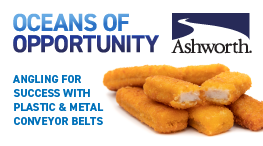The Dutch concern Depron makes packaging products for the food and non-food industries for markets across Europe.
Polylactic acid (PLA) is a compound derived from renewable resources such as corn starch, sugarcane, or tapioca that can be used for the manufacture of plastic packaging materials that have several advantages over plastics produced from oil. Among the companies that are using this material is Depron, a manufacturer of packaging materials based in the Netherlands.
Unlike conventional plastics derived from oil, plastic packaging made from PLA is biodegradable – over time it will degenerate into harmless natural products. In addition, the production of PLA uses less energy and results in less greenhouse gases than a comparable volume of conventional plastic. Companies using this material can claim to have reduced their carbon footprint.

Depron produces a range of packaging materials for the food industry from PLA. Compared with conventional polystyrene trays PLA trays are slightly more expensive, an issue the company is trying to solve by talking to its suppliers to try and find cost reductions. The trays come in a variety of shapes, sizes and even colours so that the customer is sure to find the one that is perfectly suited to his product. Together with the trays the company also has a range of backing boards made from extruded polystyrene foam. The backing boards can either be “dry,” a Depron patented technology, or standard. The “dry” boards absorb any moisture released by the product and also have a slightly adhesive surface that allows the product to be displayed vertically. The adhesive effect is created by the small holes in the surface of the board which create a slight suction and thereby hold on to the product even if the package is placed vertically. The slight adhesion of the product to the board also facilitates placing the board into a tray. The “dry” boards absorb fluids evenly whether the tray is laid flat or is placed vertically thereby keeping the packaging free of any visible moisture.

Both the dry boards and the natural boards are made of food grade materials that comply with all the relevant European regulations. They are very light, yet sturdy, retaining the shape of the product and stabilising the packaging. The boards are anti-microbial and available in a range of colours so that the appearance of the product can be highlighted. In addition the standard board can be easily customised with the name or logo of the supplier without compromising its other qualities.
| Depron B.V. | |
| Wetering 20
NL 6002 SM Weert The Netherlands Tel.: +31 495 458 658 Fax: +31 495 458 680 pbiesh@depron.nl www.depron.nl |
Sales and marketing director: Mr. Pieter Biesheuvel
Activities: Production of packaging material from polystyrene and more recently from polylactic acid (PLA) Customers: The food and non-food industries Volumes: About 450m units per year Markets: Germany, France, Poland, the UK, Austria, Lithuania, Estonia, the Netherlands, Scandinavia, Belgium Employees: 100 Turnover: EUR20m |
Depron was established as a fully owned subsidiary of Hoechst Holland in 1970 to manufacture polystyrene trays for the food packaging industry using the raw materials produced by another Hoechst plant in Breda, Netherlands. In 1997 Hoechst sold the company in a management buyout. Since then Depron started several new product lines including barrier trays in 2001, backing boards for fish production in 2003, and the PLA-based packaging range in 2010.









